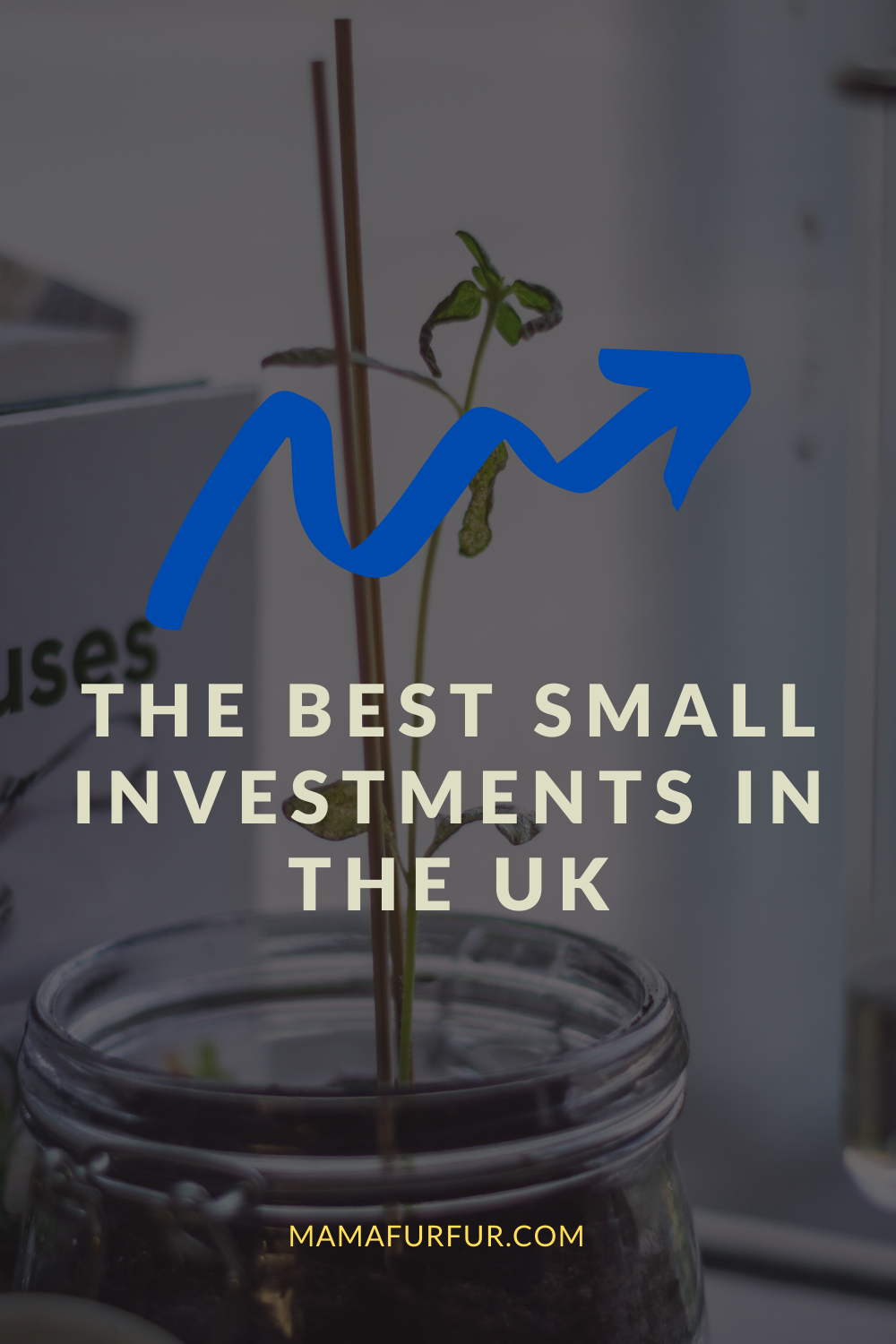Best Small Investments in the UK
If you are just starting out investing, you might want to start small – so today I am walking you through what I consider to be the best small investments in the UK right now.
With the power of compound interest, and the right vehicle for investing your small, but regular deposits, you can soon build up a substantial pot.
We will cover the best places to put small investments, from £50 right through to £1,000 and types of investments you could make.
Starting Out
Before taking the leap, if this is the first time you will be investing you need to work out some bits first:
- Your risk profile
- A fancy way of saying “how risk-averse are you” and “how much of this money are you prepared to put at risk”.
- If you’re not prepared to risk any of the capital, you would be looking at the most stable of investments, or possibly you’re prepared to take higher risks in the hopes of higher rewards.
- Fees and charges
- You want your investment to grow, so you don’t want it eaten into by too may fees or high charges.
- Learn from others
- Find out others who are investing in the same way you would like to.
- If you’re interested in cryptocurrency, for example, you could find others who are in a similar place to you and see how they’re performing and ask questions.
- Invest in what you know and understand
- For example, before you start investing in the stock market, make sure you understand the types of different investments and how they are made. If you don’t understand what you’re investing in, the chances for you to lose money is greatly increased.
- Don’t get FOMO (fear of missing out)
- I truly believe, everything that is for you, will not pass you by. Take your time and learn about what you are doing before you jump in and start.
- Diversify, diversify, diversify
- Your best friend in investing!
- If your portfolio is properly diversified, you are ensuring that should one branch of your investment tree fail, you haven’t lost everything… “don’t put all your eggs in one basket”.
1st Option: Pension
If you receive any form of income, a pension is probably your easiest option to start investing small amounts of money. If you’re employed, most employers in the UK now ask you to sacrifice a small percentage of your gross wage or salary (usually 4%) to help fund your workplace pension. These employers will often top that money up, as a thank you from them to you, for saving for your future. In turn, they will save money on corporation tax and other taxes.
Because the money you save into your pension is from your gross salary (before tax) the government gives you an uplift, from 20% up to 41%, compared to your take-home pay that you would have taken home, had you not put it in your pension.
Most schemes will allow you to do this easily through your workplace, but if you’re self-employed there are plenty of companies like PensionBee, Vanguard and others like Virgin Money who will allow you to set up a personal pension.
These small amounts of money grow tax-free in your pension, ready for your future.
With a pension, you will be investing in the stock market, so make sure you understand what your pension will be invested in. Pension funding is also capped at a maximum of £40,000 or up to 100% of your wage, whichever is less. There’s also the Lifetime Allowance, which currently stands at £1,073,100, this simply means you can’t have a pension pot that exceeds this in your lifetime.
Often your employer’s pension scheme will automatically invest your money, so be mindful that you are checking where your money is invested, and if it can be changed (most can), you should be investing in line with your risk profile.
Be mindful that your pension savings are locked away until you reach pension age. For private pensions that is currently 57 and over, and some company pensions can be up to age 65.
2nd Option: ISAs
You save into an ISA from your post-taxed, take home, pay. But, this is another investment which grows tax free, with the added benefit of being able to draw that money completely tax free. No capital gains tax or income tax applies.
There are several flavours of ISAs for those aged over 18, although there are junior versions for those under 18, that you can deposit up to £20,000 in.
If you’re very risk-averse the best types of ISAs you could deposit regular amounts of money in would be a Lifetime ISA or a cash ISA.
Cash ISA – Effectively like an immediate access bank account. It’s deposited in the bank and usually you’ll find ones that have caveats whereby you can get a higher interest rate (between 1% and 1.3%), but agree to lock that money away for a certain period of time from one year to five.
Lifetime ISA – This only works in a few circumstances, one being that you are aged under 40, and it must be used either for your first home deposit or for saving towards your retirement. The Lifetime ISA currently has a cap of £4,000 per year that can be deposited in it, and this forms part of your £20,000 overall ISA allowance.
The government will pay a 25% bonus on your deposits each year as an incentive to save – this is guaranteed money and very safe. You can have a LISA in cash or as an investment account, depending on your attitude to risk and capacity for loss.
You can pay into a Lifetime ISA from the age of 18 up to 50, but you must have started saving into a LISA before the age of 40.
3rd Option: Fixed Rate Bonds
These bonds often offer a good rate of return, usually below what could be achieved by investing the funds and are guaranteed. The downside is that you normally fix in a lump sum of money, rather than add to this saving regularly.
You do not have access to this money until the bond runs out, so you do have to be mindful that the money is not accessible before this, and if it is accessible, you’re likely to be hit with large exit penalties.
4th Option: Stock Market
This, if you’ve been following my journey for some time, you’ll know, is my favourite type of investing. The most tax-efficient way to invest small amounts in the UK is through an Investment ISA. You can use any of the £20,000 allowance that has not been used in a cash ISA or your Lifetime ISA, to invest in stocks and shares. Want to invest more than the £20,000 ISA allows per year? You can open a General Investment Account too, but make sure you utilise your tax-free ISA first.
There are a plethora of different options available to you when investing, from investing in individual companies, through to bonds and funds. Funds are usually made up of multiple different stocks or shares in different companies. Funds are a great way to diversify your investment because no single part of your portfolio is invested too heavily in one area. Check out my tutorials here on different types of investments and how to pick one that works for you.
We have a lot of different options in the UK for investing in the stock market, with a host of different platforms, almost all of whom allow you to open an Investment ISA and/or a General Investment Account as well as CFD accounts.
Specifically, I use Vanguard for my Investment ISA, Trading212 for my investing in individual companies and eToro for my CFDs. You don’t have to use all three, or any combination – it’s just what I use right now.
All of these platforms have certain criteria that must be met, for you to be able to invest with them. For example, Vanguard asks that you commit £500 as a lump sum to open an Investment ISA, GIA or a pension, but then you have access to Vanguard’s version of index funds, bonds and other things they offer.
Companies like Freetrade and Trading212 have limits from as little as £1, so they are ideal for these little amounts of money, especially if you are looking to invest in the stock market. If you wanted to invest more regularly than once a year or once a month, you could invest daily with platforms like these that have small minimum investment limits. There are tutorials here on Mamafurfur that I have created to walk you through how to start investing, linked here.
If you buy mutual or index funds, these are gatherings of companies and different commodities that are held within the one fund. If you’re investing in individual companies, this tends to be riskier – so make sure you spread your investments based on your tolerance for risk and your long-term goals. I cover what criteria I want to be met before I will invest in stocks and funds, which would be useful for you to watch if you are thinking seriously about starting to invest, linked here.
A fun way of understanding the stock market, as taught by MrMoneyJar: Essentially, when you’re investing in an individual stock, this is the same as buying a Snickers Bar, one brand and one company. Now if I put all my money into investing in Snickers Bars, my investment return is based completely on people buying Snickers Bars, and if no one buys and the company goes under, I lose all of my investment.
Whereas, an index fund or mutual fund, where they blend lots of different options for you, is kind of like a box of Celebrations (and no, this post is not sponsored by Celebrations – I wish!). So, if Snickers went down, but I owned the fund which had all the different chocolate bars in like boxes of Celebrations do, only one part of my investment would be down because the box of Celebrations is diversified with seven or eight different chocolate bars, all making up, individually, a small part of my overall investment.
5th Option: Property
A great investment is buying a home. Your home, if you have bought it, is one of the best investments you can make. It’s a safe surrounding for you, even if the value goes up or down, it doesn’t matter, you’ve always got somewhere to live, as well as that peace and security it brings.
Now, if you have your home, and you are in a position to do so, overpaying your mortgage is a great way to save. If you committed to just a 10% overpayment on your monthly mortgage payment you could reduce a 25-year mortgage down to 22 years, making you mortgage-free three years sooner, at which point you can transfer the money you were paying on your mortgage and put it into an investment towards your future. For a mortgage of £650 per month, that’s a commitment of just £65 per month, the cost of a few takeaways can have a massive impact on your finances long-term.
Another way you can invest small amounts in property would be through Real Estate Investment Trusts. Collectively a group of people put money together to buy properties. The rates of return are based on the demand in the market, so they are riskier. Most REITs make money through capital appreciation as well as people paying rent for the properties that the trust has bought. If tenants to those properties stop paying rent, the return will be less.
6th Option: Invest in a Small Business/Yourself
Invest in yourself! Could that small amount of money you have available, be used towards a business idea you have? This could have the biggest return out of all of the above options – Jeff Bezos anyone?!
Avoid get rich quick schemes. Always remember that if something sounds too good to be true, it probably is. I’m forever seeing Facebook ads from people promising that if you invest £1,000 with them, you can get your money back 15 times over – spoiler alert, you probably won’t see any of your money again, let alone a good return!
Sometimes all you need to invest is your time because there are businesses that can be started from something as simple as your mobile phone.
Invest in yourself by upskilling, taking courses and reading self-development books. Some of my favourites are:
- I Will Teach You to Be Rich – Ramit Sethi
- Money Master the Game – Tony Robbins
- The 7 Habits of Highly Effective People – Stephen R. Covey
- Profit First – Mike Michalowicz
- Open Your Mind To Prosperity – Catherine Ponder
Summary
The key points to take away before you pick an investment vehicle that’s right for you:
- Think about how quickly you want access to the money. Do you want to access when you retire? In a few years? Next week?
- How quickly do you want your investment to grow? This will help with the risk factor and where’s best to put your money.
- How involved do you want to be? Do you actively want to manage it daily, or do you want to be able to put money in once a month and forget about it?
- How much time do you want to dedicate to this investment? Are you willing to put the time in?











